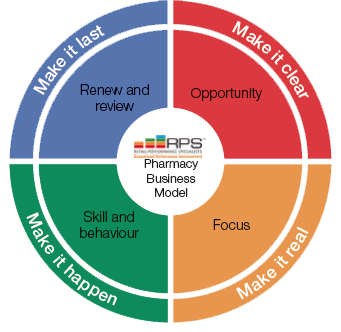People & team training

Better performance through mindset change
In People & team training
Bookmark
Record learning outcomes
It’s not just what you do in the pharmacy, it’s the way that you do it that customers and patients will notice

Not only is the regulatory landscape changing, the workplace is also changing rapidly, and in some circumstances this seems to be in line with expectations around the fourth industrial revolution, where technologies are merging with human interaction. An example of this in pharmacy is the emergence of automated dispensing robots.
Technology makes change possible, but it takes attitude – specifically a positive mindset – to make it happen. These changes will affect all working environments, as can be seen with the big changes that have already happened with retail automation. For example, online behemoth Amazon is already bigger than retail giant Walmart, and at the bricks and mortar level, supermarkets have created self-scanning checkouts.
Community pharmacy is also experiencing this revolution and changes are already happening. Superdrug, for example, has an online doctor and prescription delivery service.
Point of difference
But where is the differentiation, and what difference do people and teamwork make?
While some businesses have a bad name because of their poor service, or because they are unresponsive, companies such as Apple and their retail outlets continue to appeal to their audience. Other winners include home entertainment retailer Richer Sounds, which commands a loyal following, and the John Lewis Partnership, which is still sought after in a retail sector where other department stores struggle.
All these businesses are appreciated for their combination of desirable products, an appealing environment and, crucially, the people who help customers with great advice and encourage them to buy better.
People power
So, why do retailers, including some pharmacies, undervalue the benefits their people bring to the retail experience, with their ability to help customers feel valued and build repeat business?
At Retail Performance Specialists, we believe most people want to do a good job when they go to work, yet some community pharmacies give off an unhelpful vibe with inattentive and task-focused staff, while others have created an environment that delivers a memorable experience.
As an aside, I’ll tell you about my recent experience at the rubbish dump. Last week, I took our recently defunct fridge to the dump and asked the high-vis attendant where I should put it.
“Ah, you’ll be wanting the second-hand fridge department.”“Yes please.”
“It will be easiest if you go back around, and as you drive in go straight across to the section in green.
While you are there, do you see those trees?”
“Yes.”
“There is a nice tree with plums, you may like to try a few.”
“Thank you!”
If TripAdvisor had a category for refuse, I would have given them five stars. He made my trip much more enjoyable and memorable. Do your team make the trip more enjoyable for your customers?
I’ll give you another example. Recently, I was in a pharmacy picking up a prescription for an elderly relative. While I was there, the pharmacist was chatting to a patient. It was obvious that the patient had a problem with the prescription that had just been dispensed – they couldn’t take the capsules that had been dispensed, and so needed tablets.
A small queue was forming due to a backlog of what I imagine was a pile of prescriptions waiting to be checked in the dispensary. Nevertheless, the pharmacist took the time to understand the issue, ask a few questions and reassure the patient that the problem would be sorted out immediately without them having to go back to their doctor for a new prescription.
The pharmacist said they would speak to the GP practice to get a new prescription and ensure the repeat prescription was also for tablets.
Yes, I may have had to wait a bit longer for my prescription, but I was reassured that this pharmacy team were prepared to go out of their way to help people when they needed it. I’m sure this didn’t go unnoticed by the other customers who were waiting. Contrast this with a busy pharmacy that would have just sent the patient back to the GP practice to get it sorted themselves.
The mum rule
The key, you may recall, is “attitude makes it happen”. We all know good people who make it happen for customers, and great leadership is when your whole team makes it happen.
A simple rule – treat everyone like they are your mum. If we could manage to do that, then we would build a loyal customer base who would buy more from us, come back more often and recommend us to their friends and family.
Stand and watch your people engage with customers, observe the difference in their approaches, and capture what your best people do. Whether they all adopt suggestions is an question of attitude or, as we like to say, a mindset matter.
Many of those who fail to engage do so because they can’t see the point. These people just need help to see the opportunity to enjoy their job more by helping more and improving business.
Interestingly, according to a recent report from Accenture, many workers already know their jobs may be at risk in the future:
- 95 per cent of people think they will need a new skill to stay in work
- 74 per cent expect part of their job to be automated
- 81 per cent would spend free time to learn a new skill
- 29 per cent rate employer opportunities as excellent
Team engagement
Do your people believe your business will help them do better, improve their skills and enjoy talking about working for you? The intrinsic value of working for you is worth as much and the extrinsic remuneration.
So, how do we engage the team and create a high-performing team?
The mood in the workplace is changing. There is a new ‘app-titude’, as we call it, developed from technology, apps and social media. This includes:
- A short attention span
- Expectation of instant results
- Knowledge that I can Google; I do not need to remember
- Commoditisation of products and service through online
- The ‘gig economy’ meaning I can choose where and when to work.
We need to lead, but also adapt to the modern way of learning.
People want:
- Autonomy – to get on with their job
- Flexibility – to make decisions
- Novelty to sustain interest.
In return, the business gets accountability for the outcomes. Many businesses today, particularly in IT, such as Netflix and Apple, have no rules, just accountability. This is called a ROWE (results-only work environment), and works even to the extent that employees are expected to source their own training if they need it.
Leap of faith
There is a structured way to engage your team with little risk or cost and to grow your business. Creating an environment that empowers and enables people through autonomy and accountability will improve business performance significantly.
To get started, you need to make the team completely responsible for improving performance. There are a number of steps to follow:
- Ask – what opportunities exist to improve business performance through a better customer experience
- Pick – have the team pick the greatest opportunity
- Plan – have the team list the actions
- Practice – the techniques needed to deliver the new customer experience.
- Measure – how will we know the plan is working, which number or KPI
will it move? - Target – set a target, this programmes the brain to search for opportunities.
- Track – review at intervals, adjust if needed.
- Review, recognise and reward – at the end, recognise the effort and changes
made, review how the plan went and rewardsuccess.
You don’t need to go it alone. RPS has a wealth of experience in improving business performance, and our people performance system is a simple four-step system that will improve commercial performance and build stronger, happier teams.
The Pharmacy Growth Programme
Increase your revenue generation, enhance team dynamics, maximise your bottom line and profitability while taking your business success to the next level.
The pharmacy profession is changing at an accelerated rate and relying on NHS income alone is no longer an option. Every pharmacy has to develop new income opportunities. The Pharmacy Growth Programme trains you and your pharmacy team and provides expert support to help you implement business plans, improve patient services and develop your gold standard pharmacy.
A unique Pharmacy Growth Programme is structured for your growth, based on the current market dynamics. You’ll receive:
- A diagnostic to analyse the health of your pharmacy business
- A series of workshops for the pharmacy senior management team
- On-site implementation support.
The programme will help you to improve the following KPIs:
- Script numbers
- MURs
- NMS
- EPS
- OTC
- Locally commissioned services
- Private services
- Profitability.
Find out more
Dennis Reid of Retail Performance Specialists is a retail specialist who helps companies increase sales, performance and profitability. He has more than 35 years’ experience and has worked with major companies including Nike, Gucci, Nokia and Marks & Spencer.
He now works with community pharmacies to deliver the Pharmacy Growth Programme, and is so confident in the team’s expertise that the company is guaranteeing a 10-fold return on investment over 18 months or your fee returned.

- To explore how the Pharmacy Growth Programme could benefit your business, call Dennis Reid on 01344 849397, dennis@rps-global.com, or Barry Martin on 07817 912745
